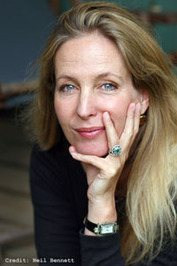Katie Hickman is the author of the new book Brave Hearted: The Women of the American West. Her many other books include She-Merchants, Buccaneers and Gentlewomen. She lives in London.
Q: You write, “Women's experiences are the very core of any true understanding of the reality of the American West.” What inspired you to write Brave Hearted, and how do you think your book challenges some of the perceptions of the “Wild West”?
A: I think most of our perceptions about the American West are still so dominated by what you might call the “Hollywood” version of people and events. And of course, that is extremely male – you know, the kind of thing, gunslingers, outlaws, bandits, etc.
But in fact, when it came to putting down permanent settlements in the West, it could not be done without women. It is really interesting to note that the great westward migrations that began in the mid-19th century were very much family affairs.
Q: The writer Emma Donoghue called the book a “vivid, fascinating rag rug of cultural history that braids together stories usually kept apart.” What do you think of that description?
A: I really loved Emma Donoghue’s description, and I think it’s pretty accurate. The sources that I was using – I mean the scholarship of other historians – really tended to concentrate on just one aspect of the period.
For example, studies of Black settlers, the Chinese presence in San Francisco, or histories of a particular Native tribe. Sometimes they were even more specialized. I’m thinking of a marvelous book I came across about the role of laundresses in the US Army – fascinating but pretty “niche.”
They were all really wonderful in their own way, but it was surprisingly hard to find anything that gave a really good overview – so I guess this is what I was trying to do.
Q: How did you research the book, and what did you learn that especially surprised you?
A: I did almost all my research in the British Library here in London, which has an extremely good collection of “Americana.” The sources that I was most pleased and surprised to find were the ones written by Native American women – since most Tribes preferred to use oral history to record their past, much of their version of events has been lost.
My best discovery was of the work by an amazing half-Irish, half-Hunkpapa Lakota historian, Josephine Waggoner. Her vast history of her people, Witness: A Hunkpapa Historian’s Strong-Heart Song of the Lakota (brilliantly edited by an independent scholar called Emily Levine), was only published 70 years – 70 years! – after her death. I have my own copy, and I treasure it.
Q: Can you say more about the women whose stories particularly stand out for you?
A: Two of the Native American women who wrote their stories down: Josephine Waggoner (mentioned above) and Susan Bordeaux, who wrote another extraordinary account about growing up biracial (her mother was a Brulé) on the Laramie Plains.
I loved the story of Biddy Mason, an enslaved woman who fought for her freedom through the California courts – and won; and I also very much enjoyed spending time with Louise Clappe, a highly educated, middle-class woman who lived in two tiny mining communities during the Gold Rush and wrote down her experiences (not at all what you would imagine).
Q: What are you working on now?
A: Brave Hearted is my 10th book to date, and I’m having a rest!
Q: Anything else we should know?
A: The story of the westward migrations to the American West is truly one of the great epic tales of all time – I could not be prouder that I got to write this book.
--Interview with Deborah Kalb


No comments:
Post a Comment